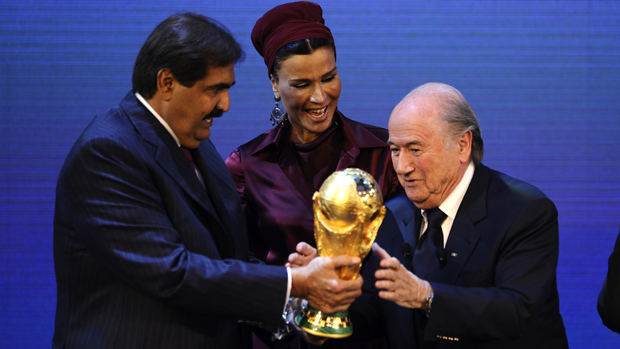Qatar World Cup controversy: bribes, slavery and alcohol
Decision to award the 2022 World Cup to the tiny Gulf state has given Fifa plenty of headaches

A free daily email with the biggest news stories of the day – and the best features from TheWeek.com
You are now subscribed
Your newsletter sign-up was successful
THE decision to award the 2022 football World Cup to the tiny Gulf state of Qatar has caused controversy from the moment it was announced in December 2010. There have been rows about the voting, the political landscape in the country, the venues, their construction and the climate. Since the decision, Fifa has had its credibility questioned and has been dogged by allegations of corruption. Here's a guide to the major controversies: The vote: Back in 2010 many Premier League fans were already fuming over Fifa's decision to overlook England and hand the 2018 tournament to Russia. Then, minutes later, Sepp Blatter stunned the audience in Zurich by revealing that the 2022 tournament would be held in Qatar, an oil-rich Arab state perched next to Saudi Arabia on the Persian Gulf, with little or no football pedigree. Amid the outcry were allegations of wrong-doing, bribes and backroom deals. A whistleblower from within the bid team came forward with claims of corruption, but later recanted. But three years after the vote Fifa president Blatter told a German magazine there had been "direct political influence" in the vote. Why? Because some countries had major economic interests in the country, he claimed. The Bin Hammam affair: Within months of being awarded the 2022 World Cup, Qatar's representative on Fifa's executive council, Mohammed Bin Hammam, had been banned from football for life in the wake of a huge corruption scandal revolving around the 2011 Fifa presidential elections. Bin Hammam was the main challenger to Sepp Blatter, but his campaign came off the rails when he and several other high profile figures, including Jack Warner, president of the Caribbean Football Union were accused of trying to buy votes. Qatar insists Hammam was not involved in its World Cup bid, but his demise and more general allegations about how Fifa operates have done nothing to dispel the fog of suspicion around the decision. A winter World Cup: "From the moment the tiny Gulf state was chosen, it was as clear as the Zurich mountain air that it would be problematic at best and a catastrophic folly at worst," says Sky Sports reporter Paul Kelso. "It should not have needed experts to explain that playing the world's greatest football tournament in the desert in summer was lunacy, but Fifa commissioned some anyway." They recommended that the event should not take place when daytime temperatures soar to 50C. However, moving the tournament is not a simple exercise. Such a move would disrupt the traditional football calendar and could lead to clashes with the Winter Olympics and the Super Bowl. Uefa eventually approved a switch, but Fifa's executive council (which awarded Qatar the event in the first place) has expressed reservations.
Compensation claims: Plans to move the tournament to the northern hemisphere winter did not go down well in Australia, one of the unsuccessful bidders for the 2022 event. It said it could seek compensation after spending millions on its failed bid, which involved a summer tournament, and because a winter competition would affect its domestic football league. Australian football chief said he did not want his complaints interpreted as "sour grapes". But Fifa, no doubt fearful that other, more lucrative, leagues could also demand compensation if their schedule were disrupted, have insisted there are "no grounds" for compensation. TV contracts: If football leagues have no right to compensation then TV companies might. Many broadcasters brought the rights to the tournament expecting it to be held in the summer. In the US, Fox paid $425m for the rights to the 2018 and 2022 World Cups, reports the Daily Telegraph. The company did not expect to be competing against the NFL in the ratings. "Talks are understood to have taken place that could ultimately mean Fox would pay less if the tournament moves," says the paper. "Other international broadcasters which agreed deals worth a total of £2bn in 2011, may be appeased in similar fashion." Slavery and forced labour: Qatar is having to build everything it needs for the tournament, from stadiums to hotels, from scratch and is spending $100bn on the project. However, last month a Guardian expose of working conditions for migrant labourers, particularly from Nepal, cast another cloud over the event. The paper said it uncovered evidence of forced labour and conditions amounting to slavery on the huge World Cup infrastructure project. "The overall picture is of one of the richest nations exploiting one of the poorest to get ready for the world's most popular sporting tournament," said the paper. The organisers have promised to investigate.
Social issues: Soon after Qatar was awarded the World Cup questions were raised about the apparent clash between its conservative attitudes and the expectation of many football fans. Qatar has strict laws against homosexuality, and alcohol is not freely available. Sepp Blatter tried to brush off concerns about homophobia in typically flippant style, telling gay fans to "refrain from any sexual activities". He later apologised, after the comment went down about as well as a World Cup match without any beer... which is also a distinct possibility.
The Week
Escape your echo chamber. Get the facts behind the news, plus analysis from multiple perspectives.

Sign up for The Week's Free Newsletters
From our morning news briefing to a weekly Good News Newsletter, get the best of The Week delivered directly to your inbox.
From our morning news briefing to a weekly Good News Newsletter, get the best of The Week delivered directly to your inbox.
A free daily email with the biggest news stories of the day – and the best features from TheWeek.com